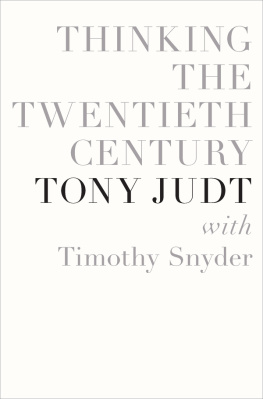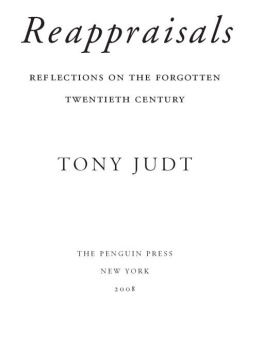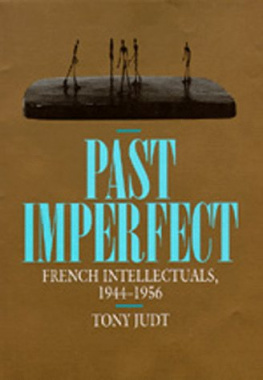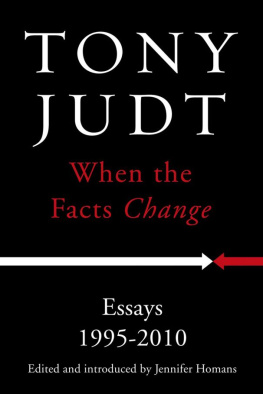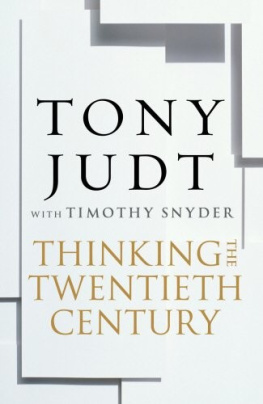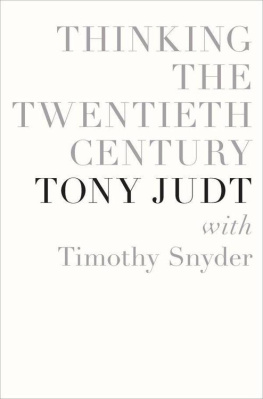A LSO BY T ONY J UDT
The Memory Chalet
Ill Fares the Land
Reappraisals: Reflections on the Forgotten Twentieth Century
Postwar: A History of Europe Since 1945
The Politics of Retribution in Europe (edited with Jan Gross and Istvn Dek)
The Burden of Responsibility: Blum, Camus, Aron, and the French Twentieth Century
Language, Nation and State: Identity Politics in a Multilingual Age (edited with Denis Lacorne)
A Grand Illusion?: An Essay on Europe
Past Imperfect: French Intellectuals, 19441956
Marxism and the French Left: Studies on Labor and Politics in France 19301982
Resistance and Revolution in Mediterranean Europe 19391948 (editor)
Socialism in Provence 18711914: A Study in the Origins of the Modern French Left
La reconstruction du Parti Socialiste 19211926
A LSO BY T IMOTHY S NYDER
Bloodlands: Europe Between Hitler and Stalin
The Red Prince: The Secret Lives of a Habsburg Archduke
Sketches from a Secret War: A Polish Artists Mission to Liberate Soviet Ukraine
The Reconstruction of Nations: Poland, Ukraine, Lithuania, Belarus, 15691999
The Wall Around the West: State Borders and Immigration Controls in North America and Europe (edited with Peter Andreas)
Nationalism, Marxism, and Modern Central Europe: A Biography of Kazimierz Kelles-Krauz (18721905)
THINKING
THE
TWENTIETH CENTURY
TONY JUDT
with Timothy Snyder
THE PENGUIN PRESS | NEW YORK | 2012
THE PENGUIN PRESS
Published by the Penguin Group
Penguin Group (USA) Inc., 375 Hudson Street, New York, New York 10014, U.S.A. Penguin Group (Canada), 90 Eglinton Avenue East, Suite 700, Toronto, Ontario, Canada M4P 2Y3 (a division of Pearson Penguin Canada Inc.) Penguin Books Ltd, 80 Strand, London WC2R 0RL, England Penguin Ireland, 25 St. Stephens Green, Dublin 2, Ireland (a division of Penguin Books Ltd) Penguin Books Australia Ltd, 250 Camberwell Road, Camberwell, Victoria 3124, Australia (a division of Pearson Australia Group Pty Ltd) Penguin Books India Pvt Ltd, 11 Community Centre, Panchsheel Park, New Delhi 110 017, India Penguin Group (NZ), 67 Apollo Drive, Rosedale, Auckland 0632, New Zealand (a division of Pearson New Zealand Ltd) Penguin Books (South Africa) (Pty) Ltd, 24 Sturdee Avenue, Rosebank, Johannesburg 2196, South Africa
Penguin Books Ltd, Registered Offices:
80 Strand, London WC2R 0RL, England
First published in 2012 by The Penguin Press,
a member of Penguin Group (USA) Inc.
Copyright The Estate of Tony Judt, 2012
Introduction copyright Timothy Snyder, 2012
All rights reserved
LIBRARY OF CONGRESS CATALOGING IN PUBLICATION DATA
Judt, Tony.
Thinking the twentieth century / Tony Judt, with Timothy Snyder.
p. cm.
Includes bibliographical references and index.
ISBN 978-1-101-55987-1
1. Judt, TonyInterviews. 2. Judt, TonyPolitical and social views. 3. Political sciencePhilosophyHistory20th century. 4. HistoryPhilosophyHistory20th century. I. Snyder, Timothy. II. Title. III. Title: Thinking the 20th century.
JC257.J83J8 2012
320.092dc23
2011031473
DESIGNED BY AMANDA DEWEY
No part of this book may be reproduced, scanned, or distributed in any printed or electronic form without permission. Please do not participate in or encourage piracy of copyrighted materials in violation of the authors rights. Purchase only authorized editions.

CONTENTS
FOREWORD
T his book is history, biography and ethical treatise.
It is a history of modern political ideas in Europe and the United States. Its subjects are power and justice, as understood by liberal, socialist, communist, nationalist and fascist intellectuals from the late nineteenth through the early twenty-first century. It is also the intellectual biography of the historian and essayist Tony Judt, born in London in the middle of the twentieth century, just after the cataclysm of the Second World War and the Holocaust, and just as communists were securing power in Eastern Europe. Finally, it is a contemplation of the limitations (and capacity for renewal) of political ideas, and of the moral failures (and duties) of intellectuals in politics.
To my mind, Tony Judt is the only person capable of writing such a broad treatment of the politics of ideas. As of 2008, Tony was the author of intense and polemical studies of French history, essays on intellectuals and their engagement, and a magnificent history of Europe since 1945, entitled Postwar. He had allowed his gifts for moralization and for historiography to find distinct outlets in brief reviews and longer scholarly studies, and had brought both forms very close to perfection. This book arose, however, because at a certain point that November I understood that Tony would be incapable of any further writing at all, at least in the conventional sense. I proposed to Tony that we write a book together the day after I realized that he could no longer use his hands. Tony had been stricken with ALS (amyotrophic lateral sclerosis), a degenerative neurological disorder that brings progressive paralysis and certain and usually rapid death.
This book takes the form of a long conversation between Tony and myself. On Thursdays during the winter, spring and summer of 2009, I took the 8:50 train from New Haven to New Yorks Grand Central Station, then the subway downtown to the neighborhood where Tony lived with his wife, Jennifer Homans, and their sons, Daniel and Nick. Our meetings were scheduled for eleven in the morning; usually I had about ten minutes in a caf to collect my thoughts about the days subject and make a few notes. I washed my hands in very hot water in the caf and then again in Tonys apartment; Tony suffered terribly from colds in his condition, and I wanted to be able to grasp his hand.
When we began our conversation in January 2009, Tony was still walking. He could not turn the knob to open the door to his apartment, but he could stand behind it and greet me. Soon he was welcoming me from an armchair in the sitting room. By spring his nose and much of his head were covered by a mechanical breathing apparatus, doing the work that his lungs no longer could. In summer we met in his study, surrounded by books, Tony looking down at me from an imposing electric wheelchair. Sometimes I would work its controls, since of course Tony could not. By now Tony was largely unable to move his body at all, save his head, eyes and vocal chords. For the purposes of this book, that was enough.
To watch the course of this destructive illness was a great sadness, especially in moments of rapid decline. In April 2009, having seen Tony lose the use of his legs and then his lungs in a matter of weeks, I was convinced (as were, I had the impression, his doctors) that he had no more than a few weeks to live. I was and am thus all the more grateful to Jenny and the boys for sharing Tony with me during such a time. But the conversation was also a great source of intellectual sustenance, bringing the pleasure of concentration, the harmony of communication and the gratification of good work achieved. Attending to the subjects at hand, and keeping pace with Tonys mind, was an absorbing labor, and also a happy one.
I am a historian of Eastern Europe, where the spoken book enjoys a proud tradition. The most famous example of the genre is the Czech writer Karel Capeks series of interviews with Tom Masaryk, the philosopher-president of interwar Czechoslovakia. This happens to be the first book that Tony read in Czech from cover to cover. Perhaps the best spoken book is
Next page
